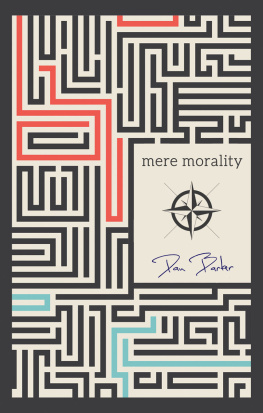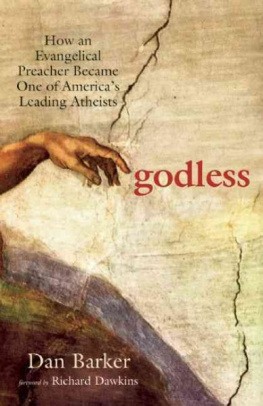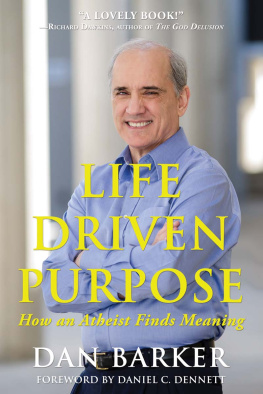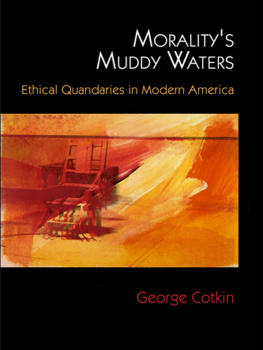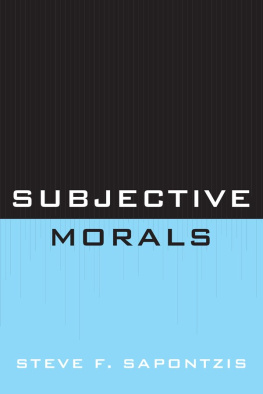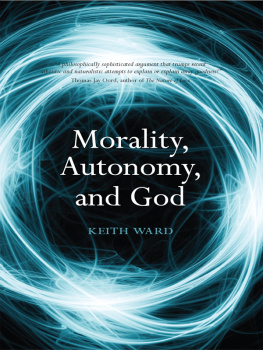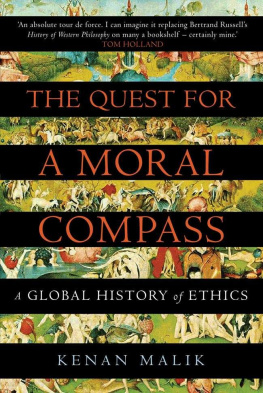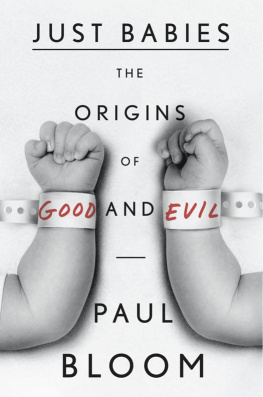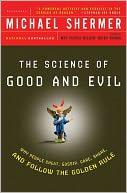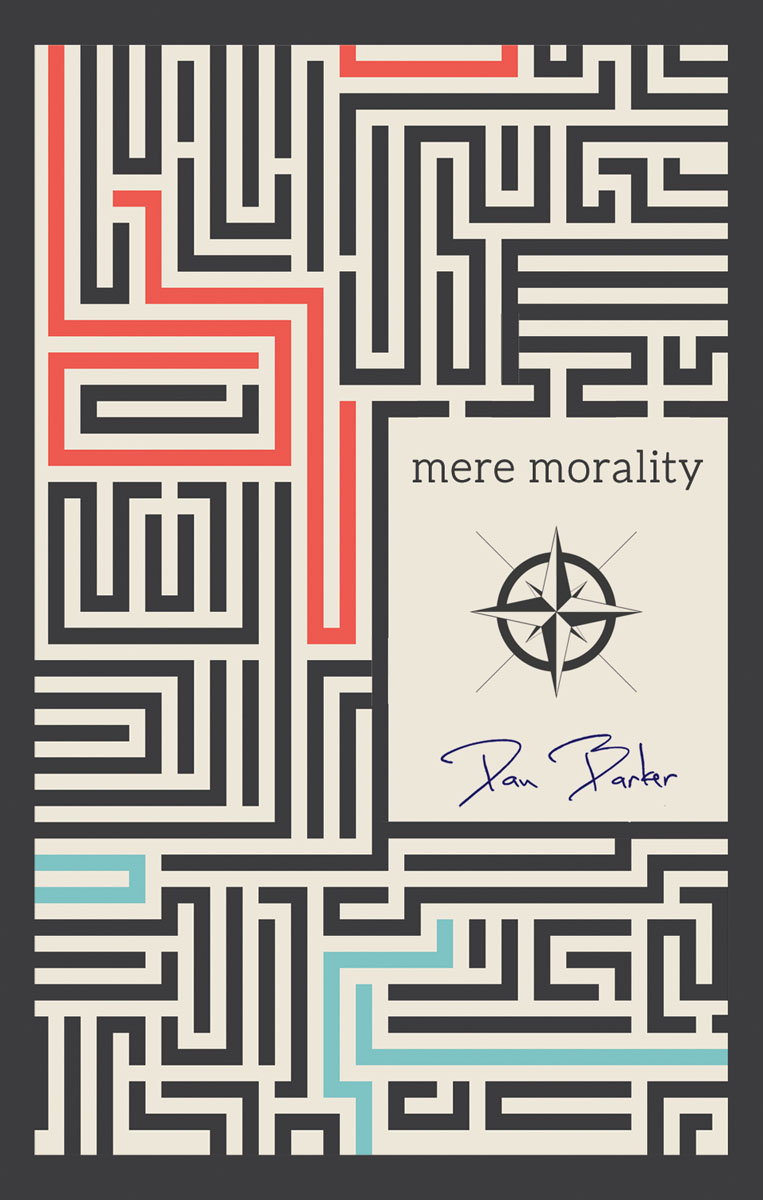

Pitchstone Publishing
Durham, North Carolina
www.pitchstonepublishing.com
Copyright 2018 by Dan Barker
All rights reserved. No part of this publication may be reproduced, stored in or introduced into a retrieval system, or transmitted, in any form, or by any means (electronic, mechanical, photocopying, recording or otherwise) without the prior written permission of the publisher.
Portions of this book originally appeared in Life Driven Purpose: How an Atheist Finds Meaning (Durham, NC: Pitchstone Publishing, 2015).
Printed in the USA
10 9 8 7 6 5 4 3 2 1
Library of Congress Cataloging-in-Publication Data
Names: Barker, Dan, author.
Title: Mere morality / Dan Barker.
Description: Durham, North Carolina : Pitchstone Publishing, 2018. | Includes bibliographical references.
Identifiers: LCCN 2018040476 (print) | LCCN 2018045325 (ebook) | ISBN 9781634311793 (ePub) | ISBN 9781634311809 (ePDF) | ISBN 9781634311816 (mobi) | ISBN 9781634311786 (pbk. : alk. paper)
Subjects: LCSH: Ethics.
Classification: LCC BJ1031 (ebook) | LCC BJ1031 .B265 2018 (print) | DDC 170dc23
LC record available at https://lccn.loc.gov/2018040476
Contents

Introduction

We need a simple way to picture morality. The topic can be bewildering. Hundreds of books, articles, sermons, laws, public policy statements, and university courses have wrestled with it for centuries. Its a sprawling landscape, but does morality have to be so complicated? Is it so hard to know how to behave?
I dont think so. I think we can boil it down to a simple guide. Mere Morality is how one former preacher who is now an atheist knows how to be good without God.
In his book Mere Christianity, C. S. Lewis attempted to strip away the dispensable or discretionary doctrines of his faith by boiling the essential tenets down to the mere minimum that would be shared by all Christians regardless of their denominational differences. I am doing the same thing here for morality, reducing essential principles to the mere minimum that would be shared by all humans, not just all believers. C. S. Lewis would not have agreed with me that religion is one of the dispensable complications that needs to be stripped away from ethics, but at least he would have understood my approach.
I am not the first to talk about this. The harm principle has been articulated by others. But I am saying it in a new way, offering a novel framework for thinking about moral behavior that can clarify our deliberations as we try to negotiate the tortuous hazards of life with a minimum of harm. My Three Moral Minds model does not solve any specific problems. Rather, it serves as a tool that can orient our thoughts as we try to unravel ethical dilemmas. Mere Morality is a compass, not a map. A compass doesnt tell you where to go, but it does help you determine where you are so that you can head in the right direction as you navigate terrain or ocean currents.
This book started out as in my book Life Driven Purpose. That chapter is reproduced here, but is now enhanced with material about the biblical meaning of evil and wicked gleaned in my research for GOD: The Most Unpleasant Character in All Fiction, material that did not belong in that book. Mere Morality is now a more comprehensive stand-alone book that shows that not only can we be good without Godwe can be better.
In a discussion of morality, religion is certainly fair game. But attacking religion is not enough. Just because I am convinced that holy books are inferior moral guides does not mean I automatically have something better. If I claim we can be moral without God, I need to make a positive case for it.
A Note about Usage
Although it is commonly accepted practice to capitalize the word Bible, my personal style is to write bible, unless it is the name of a specific book, such as the New American Standard Bible, or appears in a quote. This is not disrespectful. It is un-respectful. We do the same with dictionary, which we only capitalize in the names of actual books, such as The Merriam-Webster Dictionary. Note that the adjective biblical is lowercase, while the adjectives of actual proper names are not: Victorian, Darwinian, Grecian. The Bible is a concept, not an actual book. It refers to diverse collections of variously assorted writings translated from different original documents into multiple languages employing sometimes variable and even contradictory interpretations.
I quote various English translations, including the King James Version, the New Revised Standard Version, the New International Version, and many others. I mention these translations in the beginning of the chapter The God Book, but after that, I leave them off the reference. Rather than clutter up the text with KJV and NRSV after each quote, I leave it to readers to look up passages of interest in their own preferred version.
I

Moral Minds
The beginning of wisdom and the greatest good is taking care to avoid undesirable consequences.
Epicurus
Why Did I Do It?
I was in the Detroit airport when I saw the baby fall. Heading to New York City to be a guest on the Phil Donahue Show in 1988, I was standing in line waiting for my connecting flight to board. I was probably thinking about what I wanted to say on the show the next morningthe topic was life after deathand was not paying much attention to my surroundings. Another group was waiting to board at the next gate, and I may have noticed the young couple in that line. They had placed a baby carrier on top of a luggage cart, about three or four feet off the ground, and the father must have stepped away for a moment.
The corner of my eye saw the baby kick, my leg made a quick stride to the left and my finger tips caught the edge of the carrier as it was rolling toward the hard floor. About a second later the mother grabbed the other side. She would have been too late. That was scary! I said. Neither of us wanted to let go for a few seconds, but I finally realized I should give the baby back to the mother. She took the child out of the carrier and held it close.
You should have seen the look she gave her husband.
A couple of minutes later their group boarded the plane. As they were disappearing into the jet bridge, the mother with baby in arms turned and briefly glanced at me with no expression, a quick look that I took to mean, Thank you. I can imagine the story that mother might have later told her child about the angel in the airport. They didnt know the angel was an atheist.
What I did was not special. You would have done the same thing. Who wants to see a baby fall to a hard floor? Few people would be able to resist acting in such a situation. I surprised myself. It was instinctive and automatic, with no conscious deliberation, as if I were watching someone else. It was immediate emotion. As I was holding onto that carrier, I felt a huge relief, as if I had just saved my own child. My body was on full alert; my breathing and heart rate sped up.
Next page
